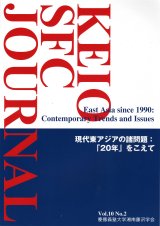- HOME
- KEIO SFC JOURNAL
- Vol.10 No.2

KEIO SFC JOURNAL Vol.10 No.2 East Asia since 1990: Contemporary Trends and Issues
published on 2011.03
-
从战略性多边主义到制度性多边主义-论冷战后中国多边外交的发展
牛 仲君 中国外交学院副教授 从一国外交与国际制度关系的角度来看,多边主义可以划分为战略性多边主义与制度性多边主义,前者强调对外交往的实践性与工具性,而后者重视国际制度与国家利益的互动关系。冷战结束以后,随着中国自身实力,国际影响力与身份定位的改变,对国际制度经历了由选择参与到全面融入,进而寻求改革创新的过程,从而使多边外交经历了一个由强调战略性多边主义到重视制度性多边主义的过程。 Since the end of the Cold War China’s national power has increased and its international influence has expanded. At the same time there have been significant changes in China’s foreign policy. China’s policy toward the international regimes has shifted from selective to full-scale participation, being in search of new avenue for engagement in the international community. China’s multilateral diplomacy is now undergoing a change from the strategic multilateralism to the institutional multilateralism.
-
从 “六四”青年到“四月青年”,从“抗议”到“捍卫”-二十年中国年轻人民族主义之变迁
杨 丽君 新加坡国立大学东亚研究所研究员 本文试图从国家和社会互动的角度来解释当代中国民族主义的变迁。笔者认为,不仅民族主义是国家和社会互动的产物,同时民族主义的重要度和影响也取决于国家和社会的互动。民族主义的表现形式随国家和社会的互动方式不同而呈现不同的形态。笔者认为改革开放以来中国经历了三波民族主义。第一波“自由民族主义”出现于70年代末到89年天安门运动期间;第二波“爱国民族主义”出现于江泽民执政时期(1989-2002);第三波“社会民族主义”民族主义出现于胡锦涛执政以来至今。 This paper attempts to explore Chinese nationalism in the context of state-society relationship by focusing on the development of nationalism in the contemporary era. I argue that while nationalism is a product of the interaction between the state and society, its significance and implications also depend on their interaction. I further divide Chinese nationalism into three periods in the reform era in terms of different patterns of state-society interaction. The first wave of nationalism or “liberal nationalism” took place between the late 1970s and 1989. The second wave of nationalism or “patriotic nationalism” happened during the era of Jiang Zemin (1989-2002). And the third wave of nationalism or “social nationalism” has been taking place since Hu Jintao came to power.
-
탈냉전 이후 북중관계의 지속과 변화
이희옥 성균관대학교 사회과학부 정치외교학과 교수 이 논문은 탈냉전 이후 북중관계의 지속과 변화를 연구한 것이다. 우선 북중관계를 장기적인 관점에서 볼 경우, 그것은 한반도 미래 시나리오와 연계되어 있다. 중국은 이를 ‘현상유지 플러스’를 추구하고 있다고 보고 있다. 둘째, 북한의 전략적 방벽의 의미가 약화되어 중국에게 부담이 되고 있다는 점에서 중국이 최소한도의 지원을 제외한 대북협력을 제한할 것으로 보았다. 셋째, 북중관계가 현재의 불투명한 관계를 모호하게 지속(muddling through)하면서 다양한 국제적 변수를 활용하여 갈등과 협력을 반복할 것으로 보았다. This paper focuses on the change and continuity of the Sino-North Korean relations since post cold. First Sino-North Korean ties are closely connected with the future scenarios of the Korean peninsula. China is evaluated to be pursuing the ‘maintenance of status quo plus’ one. Second, as North Korea’s strategic role of protective wall diminishes and become a burden to China, China limits its cooperation and coordination toward North Korea except the necessary minimum supports. Third, the current unclear situations of the North Korea-China relations muddle through that the two countries utilize flexibly the various international variables, and continue their discords and cooperation.
-
Development of Relations between Taiwan and Mainland China during 20 years and Outlook
Shih-Ping Fan Associate Professor & Director, Graduate Institute of Political Science, National Taiwan Normal University Taiwan and Mainland China have witnessed considerable changes in their internal situations during the 20 years, between 1990 and 2010, and this also results in significant changes of the cross-Strait relations. This paper presents the cross-Strait political development and outlook.
-
Internet Regulation in China - Information Control under the Party-State System
Motohiro Tsuchiya Associate Professor, Graduate School of Media and Governance, Keio University China has had regulations over mass media in varying degrees, but the Internet is a different medium by definition and Chinese people are demanding more open media. Under the Party-State system, which means adhesion between a party and a state and double governance by them, Chinese Communist Party allows only selective use of the Internet and doesn't give up Internet control. In 2010 Google, an American search engine giant, announced its withdrawal from the Chinese market due to censorship mandated by the Chinese government and cyber attacks by unknown attackers. Although Google's claim was supported by U.S. State Department and raised debates worldwide, Chinese Communist Party will stick to media control while striking a balance between social order and economic development.
-
Estimation of the Trend of China's Military Expenditure - An approach with the State-Space Models
Takahiro Tsuchiya Senior Visiting Researcher, Keio Research Institute at SFC Junior Research Fellow, National Defense Academy China's military expenditure is said to be 1.4 to 24 times larger than the official national defense expenditure. As a result a gap with the international society's estimations emerges. If China's military expenditure is treated as an unknown parameter to be presumed from the national military expenditure, it is possible to estimate it as a state parameter, which depends on the following variables; (1) changes in auto-regression of the national defense expenditures; (2) the impact of the economic growth and changes according to it; (3) the impact of other variables and changes according to them. The purpose of this paper is to examine whether these variables can explain the trend of China's military expenditure according to the state-space model.
Download this article (PDF): SFCJ10-2-06.pdf -
Visualization of Political Connectedness of a Chinese Local Politics-A case study of the Yangzhou City People's Congress in Jiangsu Province
Tomoki Kamo Associate Professor, Faculty of Policy Management, Keio University Motohiro Tsuchiya Associate Professor, Graduate School of Media and Governance, Keio University In this article, using a method of political network analysis, we have analyzed political connections of members of the Local People's Congress, which is the parliament in modern China. The people's congresspersons submit bills that represent the interests of their electoral districts. In general, the people's congresspersons from the same electoral district who have the common political and economic interests submit bills in cooperation. Our analysis found that among those proposing bills, the congresspersons proposing the more proactive bills were not necessarily members of the Chinese Communist Party serving in high level government positions, but were people serving in marginal positions that were not members of the Communist Party and were ranked relatively low on the political ladder.
-
Life-design as a Social Norm - A creation of "independent individual" and the politics of Life-planning
Eiji Gon Senior Visiting Researcher, Keio Research Institute at SFC In the age of revision of welfare policies after late 1970's in Japan, the meaning of Life-planning/Life-designing was changed from as a private and optional act to as normative act. The government altered "ikigai" policy in order to encourage new type of social value, "independence and self-help", and tried to reconstruct people's livelihood through the development of the social indicators. In the present, social importance of Life-planning/Life-designing has still mounted and various Life-design programs also keep developing. After this, we have to solve the gap of skills of Life-design among the people as political issue remained.
Download this article (PDF): SFCJ10-2-08.pdf -
The Dollarization Debate: Regional Autonomy and Federal Power in Canada - From the viewpoint of domestic confrontations between the Federal Government and Quebec, Western Provinces
Kenichiro Matsui Doctoral Program, Graduate School of Media and Governance, Keio University This paper analyzes the debate in Canada regarding whether or not dollarization policy should be adopted. It focuses on two regional cases in Canada, Quebec and the Western provinces. The paper highlights key regional political contexts that structure and frame the dollarization debate in different regions. For Quebec province, which has historically sought independence, the option of dollarization was seen as a significant instrument for constraining the power of the federal government. For the Western provinces, which have historically sought equal treatment in domestic political affairs and gained relative economic strength in 2000s, the dollarization debate has presented opportunities for exercising influence in deciding Canada's choice of exchange rate regime and bargaining power through cooperation with Quebec, casting vote.
Download this article (PDF): SFCJ10-2-09.pdf

